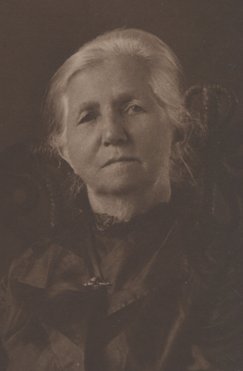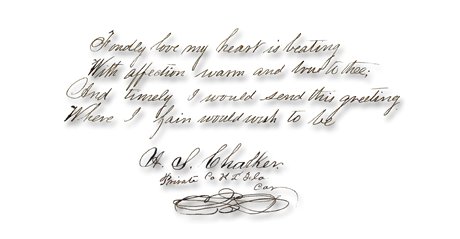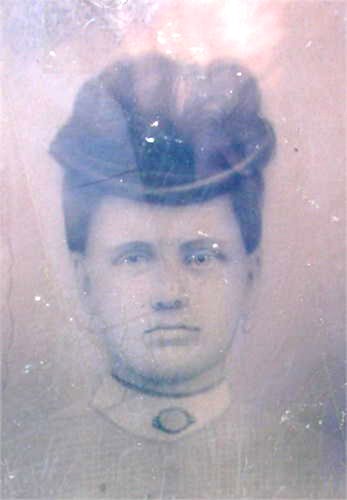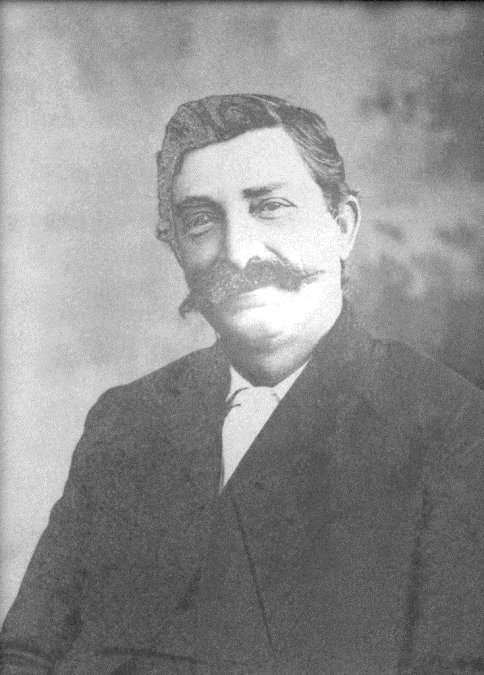All is fair in love and war
Albert Chalker and Martha “Mattie” Bardin were in love. The Civil War loomed large in their young lives and kept the sweethearts separated. The following excerpts are some of the love …
This item is available in full to subscribers.
Attention subscribers
To continue reading, you will need to either log in to your subscriber account, or purchase a new subscription.
If you are a current print subscriber, you can set up a free website account and connect your subscription to it by clicking here.
If you are a digital subscriber with an active, online-only subscription then you already have an account here. Just reset your password if you've not yet logged in to your account on this new site.
Otherwise, click here to view your options for subscribing.
Please log in to continueDon't have an ID?Print subscribersIf you're a print subscriber, but do not yet have an online account, click here to create one. Non-subscribersClick here to see your options for subscribing. Single day passYou also have the option of purchasing 24 hours of access, for $1.00. Click here to purchase a single day pass. |
All is fair in love and war
Albert Chalker and Martha “Mattie” Bardin were in love. The Civil War loomed large in their young lives and kept the sweethearts separated. The following excerpts are some of the love letters they wrote to each other – a snapshot of a life-long relationship that weathered a war and much more. Albert wrote from Camp Finegan, near Jacksonville. Albert was 19 years old when he mustered into the Confederate Army at Callahan. His commanding officer was Capt. Robert Harrison of Company K of the Second Florida Cavalry.
May 8, 1864
My Dear Mattie, I embrace the earliest opportunity of writing you a few lines, which I hope will be duly received by you. We arrived here this morning where we pitched our tents on a sand hill where the sun is beaming down on ourselves and horses with all its scorching power. If I was at Old Middleburg this evening the sun would not shine so hot, nor the time half so long. It appears to me that it has been a month since I left there….Our boys had a little fight with the yanks last Friday. We had two men wounded only, killed 2 yanks, taken 7 prisoners.
October, 12, 1864 (Baldwin, Florida)
My Dear Mattie, Your most affectionate letter of the 6th has been received and perused with the greatest pleasure and satisfaction. I was very sorry to hear of your sad misfortune, but I hope by the time you get this that you will be over that, and enjoying good health. My health is not good, but do not let that trouble you. I hope soon to recover, as I have very good attention. Our duty is very heavy as there is but four Companies of Cavalry here. We have been looking for the remainder of our Regiment some time. If it was all here our duty would be very light. We are getting plenty of corn and long forage for our horses at the present time. As to ourselves we are faring rather bad. We get no meat except fresh beef and that in very small quantities. Corn meal we get a plenty of that. Syrup one pint to the week, etc. & so on. I am very tired of fighting this way. I very often say hard things about our Confederacy and officers. I think if about half of the officers now in the army and in warehouses & ordinance stores was reduced to the rank that we would get along much better. It would be great encouragement to the soldiers. Without some great change we will lose two thirds of our regiment before Christmas. There is great dissatisfaction among the men. If McClellan is elected, it will not probably prove so disastrous. I long to see the dawning of peace…..
November 30, 1864 (Baldwin, Florida)
We had been reinforced with two Cavalry Companies last week from Georgia, of Hood’s Battalion, but we did not keep them with us long. They were ordered back to Georgia last night and it is the opinion of a great many that our Regiment will be ordered there, but I do not think so. It appears that Sherman is cutting quite a swell in Georgia, making pretense as though he intended to make us all take to our holes before spring, but it is to be hoped that he will meet up with a disappointment….One of our Scouts of Company E, Jefcoat by name, had his left hand shot off a few days ago, by a deserter he says, but it is the general opinion that he did it himself to get out of the army.
(At one point Chalker thought about deserting but Martha didn’t approve and he quickly gave up the idea.)
January, 15, 1865 (Sanderson, Florida)
Dear Albert,
I know you will think strange to see this and to learn that yours of the 17th of December has just been received which came safe to hand at last. I hope this may find you enjoying the best of health this life can afford. My health is quite good at this time. I have written to you before nearly two weeks since, and have not heard a word from you yet. Now for your scolding. I want to know why it is you have not written. Have I offended you in any way? If so let me know and not keep me in suspense as I am. I sometimes think you have gone home sick or to the hospital or that I said something in my last letter you did not like, and sometimes I think like the Dutch man’s boy. This is another one of them long lonesome Sundays. I think this is the longest day in my life. I wish you was here this evening; the time would not seem half so long and lonesome. I am very sorry you got disappointed in going home Christmas, as you expected to do, but I think if you had you would have got severely punished, and I would not have said as you said. I would give one inch and take two but give an inch and take a mile, don’t you agree with me there. I know you do say yes and laugh. I was coming to Baldwin last Wednesday had Father not went up the road to Lake City. I was very uneasy about him until today I heard from him……...
I remain Yours Affectionately, Martha Bardin
February 28, 1865 (Baldwin, Florida)
My Dear Mattie, I seat myself at my writing desk this morning to write you a few words which I hope will be received by you. These will inform you that a few words has been [received] from you, dated Feb 19th. Mattie, I have no news of interest to write you at this time, only the yanks or deserters killed Wood Ellis of Company F, 2d Fla Cav, one of our best soldiers, last Sunday morning at Hoar’s Place, 8 miles this side of Jacksonville. They shot nine balls through him, he turned his horse and rode about three hundred yards before he fell. A scout left here yesterday evening. I do not know where bound to, but I think to the front to kill and capture the enemy’s pickets, to retaliate for Ellis. I think in two or three days you will hear of
something being done. They will have satisfaction some way or other. It will be the cause of many pickets……….
March 15, 1865 (Baldwin, Florida)
My Dear Mattie, I about to start on a scout to Middleburg after some Negroes and deserters and did not get to camp until next day, and the following day I was detailed to go to Middleburg as a guard for a wagon, and when I got there I kept on home, and did not return until yesterday. Mattie, I have no news to write you that would be very interesting or amusing. I presume you have heard all about the fight at the natural bridge. We lost a very fine man out of our Co, Corpl Hawkins…………
*The battle at Natural Bridge lasted an entire day. Unable to take the bridge, the Union troops retreated. The battle prevented the Union from capturing the Florida capitol and made Tallahassee the only Confederate capitol east of the Mississippi River not to be captured by Union forces during the war. The battle is described as the last Confederate victory in the Civil War, and it was the second largest battle fought in Florida.
April 2, 1865 (Baldwin, Florida)
….There was eight deserters captured above Waldo the other day by some of Dickinson’s men, among them was Wm. Clark and a man by the name of Berry, whom we know was killed. As to the others, not knowing their fate I cannot say. Our Company is recruiting very fast, notwithstanding one deserted night before last, one who came in under Lee’s proclamation……Mattie, you don’t know how I would like to see you. If I was with you this pleasant Sunday evening I should be very happy. I think, Mattie, if I could but press my arm around your neck, and press those lips of yours to mine, it would cure those fever blisters on my lips. I hope that I shall see you before a great while. Nothing more at present. I am, Mattie, Your Loving & devoted Albert.
November 25, 1865 (Clay County, Florida)
My Dear Mattie, I find myself seated all alone this evening with pen in hand to write you a few lines, trusting they may reach you safe, and find you in the enjoyment of the best of health. Mattie, I have no news of interest to write you, only I shall go to Middleburg tomorrow, with the expectation of hearing from you. If I do not I shall be sadly disappointed. I hope to hear from you tomorrow, and hear that you will be at M. soon. The time “thought short” seems long since I saw you. I hope to see you before as much time shall pass as what has. I even flatter myself with the hope that as much more time will make you forever mine. Should we both live, I trust I shall not be disappointed in my expectations. Please excuse my short letter, Mattie, and write soon. Direct your letter to Orilla E. - Stark, Fla. I am, dear Mattie, Your Devoted Albert
After Florida’s Confederate forces surrendered, Albert Chalker was honorably paroled on May 17, 1865. He came home to Middleburg and married Martha Ann Bardin in December of 1865. Martha’s father, William S. Bardin, gave his Middleburg residence to the couple as a wedding gift. It is the Clark-Chalker House on Main Street in Middleburg. Albert and Martha Chalker settled and remained there for the rest of their lives. Albert Chalker was the postmaster for seventeen years plus served as tax collector for Clay County from 1881 to 1885. He was a businessman, ran a ferry on the south prong of Black Creek, and he managed a general store in Middleburg. The couple’s love letter collection is available at Floridamemeory.com.
There is a marker located on Main Street in Middleburg near the Clark-Chalker home. We encourage citizens to visit the site along with viewing several other homes on the historic registry along the same street. Families can easily park at the Main Street boat ramp parking lot or Middleburg Civic Center parking lot to take a leisurely stroll along Main Street, where you can imagine a reunited Albert and Mattie walking hand-in-hand in the late 1800s and early 1900s.















